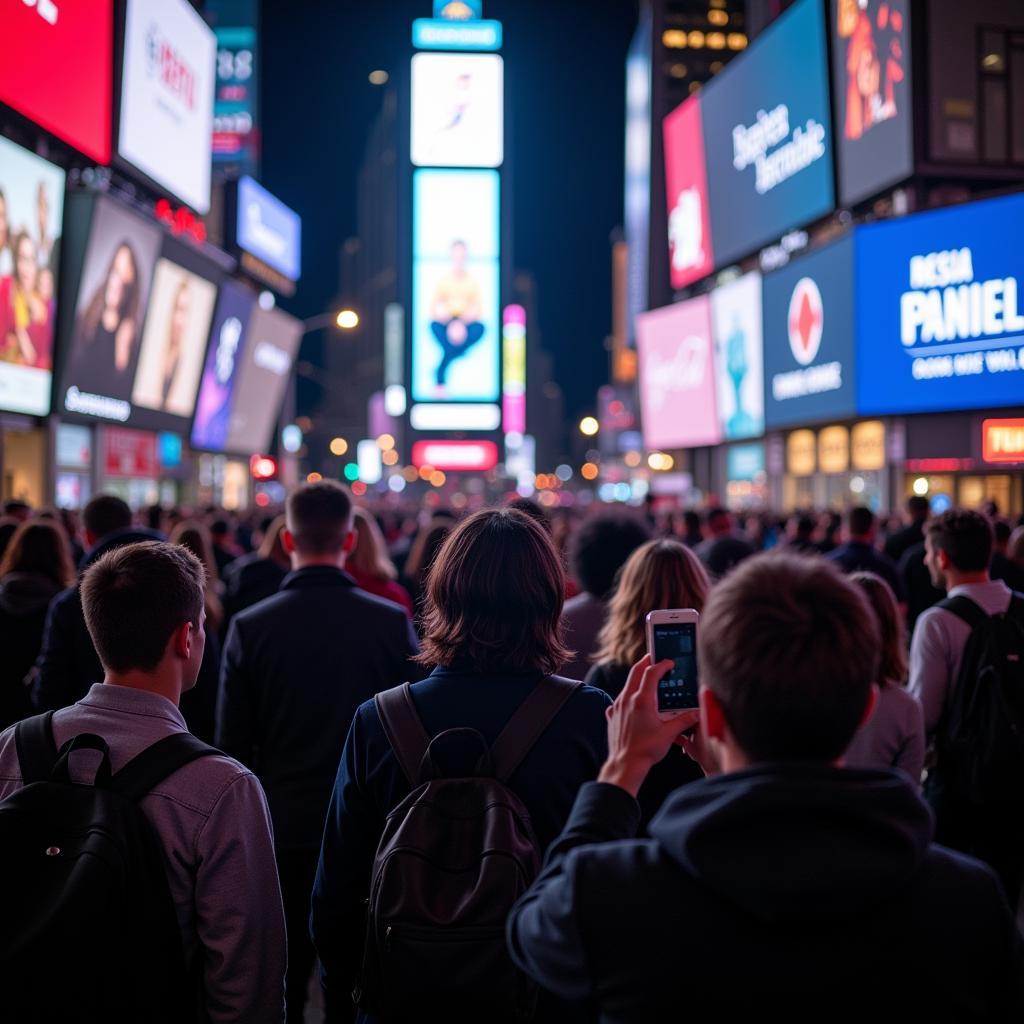The “Society of the Spectacle,” a critique of modern society penned by Guy Debord in 1967, is as relevant today as ever. But what exactly is the “society of the spectacle?” This concept, explored in Debord’s seminal work, delves into how the overwhelming presence of images and representations, fueled by mass media and consumerism, shapes our understanding of the world and ultimately alienates us from authentic experiences.
Behind the Spectacle: A Deceptive Reality
Imagine a world saturated with images, advertisements, and media that promise fulfillment and happiness. This, according to Debord, is the “spectacle,” a deceptive reality that masks the true nature of our alienation and social relations. It’s not about individual images themselves, but rather the system of representation that pervades every aspect of our lives.
The Commodity Takes Center Stage
At the heart of the spectacle lies the commodity. In a society dominated by the spectacle, our desires are manufactured by the very system that promises to satisfy them. We are constantly bombarded with images of products and experiences that promise happiness, leading us on a relentless pursuit of the next purchase, the next trend, the next fleeting moment of satisfaction.
 The Illusion of Happiness: Consumerism in the Society of the Spectacle
The Illusion of Happiness: Consumerism in the Society of the Spectacle
Alienation and the Loss of Authentic Experience
The constant bombardment of images and the relentless pursuit of commodities lead to a profound sense of alienation. We become spectators in our own lives, passively consuming the spectacle instead of actively engaging with the world around us. This detachment extends to our relationships with others, which become mediated by the spectacle and its manufactured desires.
Breaking Free: Towards a Critique of the Spectacle
Debord’s work is not a lament for a simpler time but rather a call to action. To challenge the spectacle, we must develop a critical awareness of the forces that shape our perceptions and desires. This involves questioning the images we consume, challenging the narratives we are sold, and seeking out authentic experiences that lie beyond the manufactured reality of the spectacle.
The Spectacle in the Digital Age
While Debord wrote “The Society of the Spectacle” before the rise of the internet and social media, his ideas are even more pertinent in our hyper-connected world. The internet, while holding the potential for connection and information sharing, has also become a breeding ground for the spectacle, amplifying its reach and impact on our lives.
 Social Media: Amplifying the Spectacle
Social Media: Amplifying the Spectacle
Reclaiming Our Reality: A Call to Action
So, how do we navigate a world saturated by the spectacle? How do we reclaim our agency and connect with genuine experiences? It starts with awareness, with cultivating a critical lens through which to view the world around us. By questioning the images we consume, challenging the narratives we are sold, and seeking out genuine connection, we can begin to dismantle the illusions of the spectacle and create a more authentic and fulfilling reality.
Society of the Spectacle Summary: Key Takeaways
Understanding the key tenets of Debord’s work can empower us to navigate the complexities of our image-saturated world. Here are some key takeaways:
- The Spectacle as a System of Representation: It’s not just about individual images but the overarching system that shapes our perceptions.
- The Commodity as the Central Focus: Our desires are manufactured to fuel the engine of consumerism.
- Alienation as a Consequence: The spectacle creates a distance between ourselves, others, and authentic experience.
- The Importance of Critical Awareness: Questioning the images and narratives we are presented with is crucial.
- The Digital Age and the Amplification of the Spectacle: The internet has intensified the reach and impact of the spectacle.
Frequently Asked Questions about the Society of the Spectacle
1. What are some examples of the spectacle in everyday life?
Examples include social media, advertising, celebrity culture, and the 24/7 news cycle.
2. How does the spectacle affect our relationships with others?
It can lead to superficial connections and a focus on appearances rather than genuine interaction.
3. Is it possible to escape the spectacle completely?
While complete escape is unlikely in our modern world, becoming aware of its mechanisms can help us mitigate its influence.
4. How can I apply the ideas of the “Society of the Spectacle” to my own life?
Start by becoming more mindful of your media consumption, questioning advertising messages, and seeking out authentic experiences.
5. What are some resources for further exploration of this topic?
Reading Debord’s “The Society of the Spectacle” is a great starting point. You can also find numerous articles, essays, and videos online that delve into this concept.
Need Help Navigating the Digital World?
For support in fostering peace and understanding in the digital age, reach out to the Society For Peace. Contact us at 02043854663, email us at [email protected], or visit us at Khu 34, Bac Giang, 260000, Vietnam. Our team is available 24/7 to assist you.
Explore more insights on navigating the digital landscape and promoting peace with these related resources on our website: society of the spectacle summary.